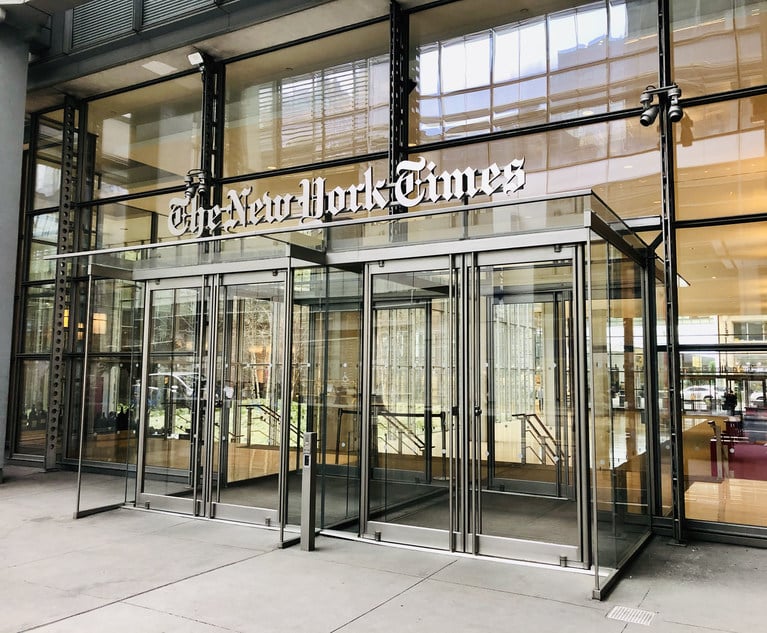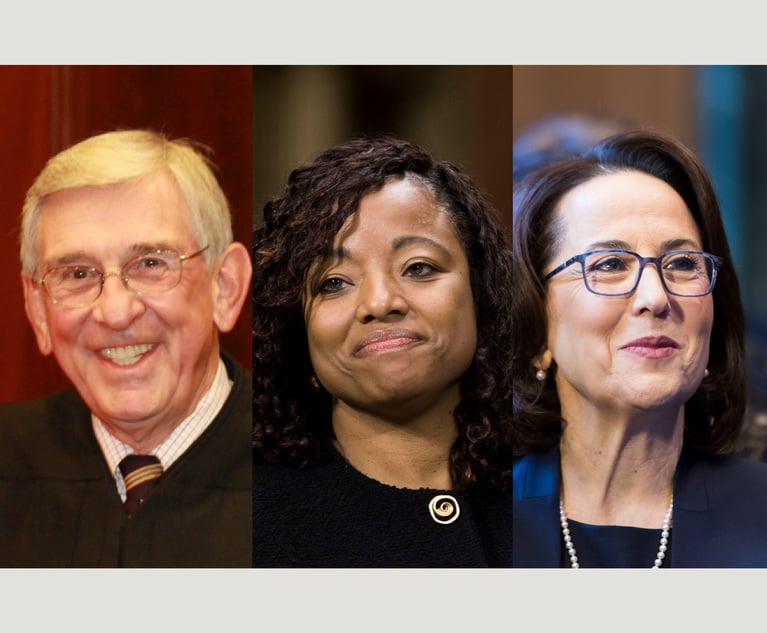 United States Postal Service Headquarters Building in Washington, D.C. Photo: Tim1965 via Wikimedia Commons
United States Postal Service Headquarters Building in Washington, D.C. Photo: Tim1965 via Wikimedia CommonsUp Next at SCOTUS: My Executive Branch Can Beat Up Your Executive Branch
One case in question could open the door for executive branch agencies to appear on opposing sides of IP fights.
December 21, 2018 at 03:52 PM
3 minute read
As the U.S. Supreme Court gears up to hear its next patent case, it's cracking open the door on an issue that could potentially allow executive branch agencies to fight each other over intellectual property.
The case in question, Return Mail v. U.S. Postal Service, will decide whether the government is a “person” who may petition for covered business method review under the America Invents Act.
This issue is so narrow—the government is only an occasional AIA petitioner—that it seems like a blank slate for interested groups to pitch their pet Patent Trial and Appeal Board gripes. For example, the Cato Institute seems to be relitigating the Article III concerns it raised in Oil States, including the PTO director's authority to “stack” panels with extra PTAB judges.
But the Cato brief, whose authors include Jones Day partner Greg Castanias and the institute's Ilya Shapiro, makes some interesting points. The attorneys point out that the PTO has the right to intervene in appeals of PTAB judgments, which means you could get “the constitutional oddity of a case pitting two agencies in the Executive Branch against one another.”
That's not their own language, by the way. They're quoting a D.C. Circuit judge's concurring opinion from a 2009 case—some guy by the name of Brett Kavanaugh.
➤➤ Want IP news that goes deeper? Geek out with Scott Graham's email briefing, Skilled in the Art. Sign up now.
The lawyers concede that Congress can permit such an oddity in narrow circumstances. But to do so, it must speak in “clear and explicit language,” not through silence.
That argument resonates with Ropes & Gray partner Matt Rizzolo. The executive branch can take both sides of the v. “if Congress has spoken directly to it,” he says. “They haven't spoken clearly in this case.”
To be fair to the government, it hasn't had an opportunity yet to file a merits brief on the “person” issue. That's because neither party argued it to the Federal Circuit—it was raised for the first time in Judge Pauline Newman's dissent.
Read more:
This content has been archived. It is available through our partners, LexisNexis® and Bloomberg Law.
To view this content, please continue to their sites.
Not a Lexis Subscriber?
Subscribe Now
Not a Bloomberg Law Subscriber?
Subscribe Now
NOT FOR REPRINT
© 2025 ALM Global, LLC, All Rights Reserved. Request academic re-use from www.copyright.com. All other uses, submit a request to [email protected]. For more information visit Asset & Logo Licensing.
You Might Like
View All
US Courts Announce Closures in Observance of Jimmy Carter National Mourning Day
2 minute read
Who Got the Work: Gibson Dunn and Wilmer to Defend BlackRock in ESG Antitrust Lawsuit
2 minute read
New York Times Moves for $100K in Attorney Fees Against Dfinity Foundation
3 minute read
Split 4th Circuit Revives Constitutional Challenge to Child Vaccine Mandate
Trending Stories
- 1Splits Among the Departments: What Might Be Ripe for the Court of Appeals
- 2Recent Developments Section 1782 Litigation and the Attorney-Client Privilege
- 3Biden's Lower Federal Court Bench Legacy
- 4Legal Finance at 15: Research Reveals What’s Fueling Growth and What’s Next
- 5New Part 160 and Presumptive ADR
Who Got The Work
Michael G. Bongiorno, Andrew Scott Dulberg and Elizabeth E. Driscoll from Wilmer Cutler Pickering Hale and Dorr have stepped in to represent Symbotic Inc., an A.I.-enabled technology platform that focuses on increasing supply chain efficiency, and other defendants in a pending shareholder derivative lawsuit. The case, filed Oct. 2 in Massachusetts District Court by the Brown Law Firm on behalf of Stephen Austen, accuses certain officers and directors of misleading investors in regard to Symbotic's potential for margin growth by failing to disclose that the company was not equipped to timely deploy its systems or manage expenses through project delays. The case, assigned to U.S. District Judge Nathaniel M. Gorton, is 1:24-cv-12522, Austen v. Cohen et al.
Who Got The Work
Edmund Polubinski and Marie Killmond of Davis Polk & Wardwell have entered appearances for data platform software development company MongoDB and other defendants in a pending shareholder derivative lawsuit. The action, filed Oct. 7 in New York Southern District Court by the Brown Law Firm, accuses the company's directors and/or officers of falsely expressing confidence in the company’s restructuring of its sales incentive plan and downplaying the severity of decreases in its upfront commitments. The case is 1:24-cv-07594, Roy v. Ittycheria et al.
Who Got The Work
Amy O. Bruchs and Kurt F. Ellison of Michael Best & Friedrich have entered appearances for Epic Systems Corp. in a pending employment discrimination lawsuit. The suit was filed Sept. 7 in Wisconsin Western District Court by Levine Eisberner LLC and Siri & Glimstad on behalf of a project manager who claims that he was wrongfully terminated after applying for a religious exemption to the defendant's COVID-19 vaccine mandate. The case, assigned to U.S. Magistrate Judge Anita Marie Boor, is 3:24-cv-00630, Secker, Nathan v. Epic Systems Corporation.
Who Got The Work
David X. Sullivan, Thomas J. Finn and Gregory A. Hall from McCarter & English have entered appearances for Sunrun Installation Services in a pending civil rights lawsuit. The complaint was filed Sept. 4 in Connecticut District Court by attorney Robert M. Berke on behalf of former employee George Edward Steins, who was arrested and charged with employing an unregistered home improvement salesperson. The complaint alleges that had Sunrun informed the Connecticut Department of Consumer Protection that the plaintiff's employment had ended in 2017 and that he no longer held Sunrun's home improvement contractor license, he would not have been hit with charges, which were dismissed in May 2024. The case, assigned to U.S. District Judge Jeffrey A. Meyer, is 3:24-cv-01423, Steins v. Sunrun, Inc. et al.
Who Got The Work
Greenberg Traurig shareholder Joshua L. Raskin has entered an appearance for boohoo.com UK Ltd. in a pending patent infringement lawsuit. The suit, filed Sept. 3 in Texas Eastern District Court by Rozier Hardt McDonough on behalf of Alto Dynamics, asserts five patents related to an online shopping platform. The case, assigned to U.S. District Judge Rodney Gilstrap, is 2:24-cv-00719, Alto Dynamics, LLC v. boohoo.com UK Limited.
Featured Firms
Law Offices of Gary Martin Hays & Associates, P.C.
(470) 294-1674
Law Offices of Mark E. Salomone
(857) 444-6468
Smith & Hassler
(713) 739-1250










